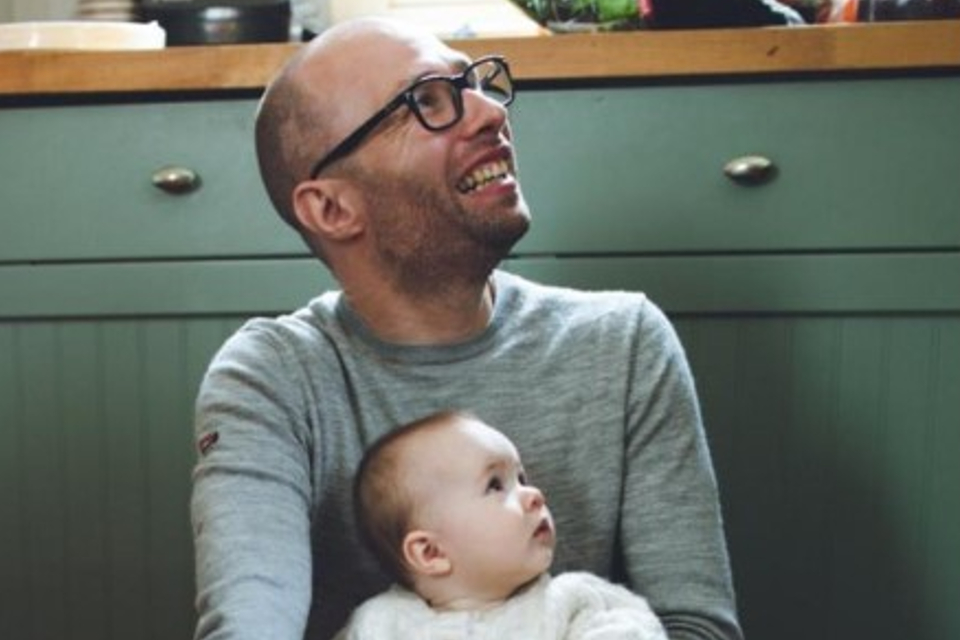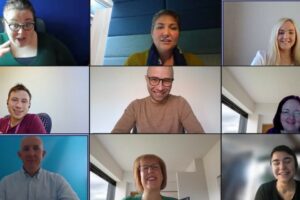
Deaf civil servant Richard Purvis sheds insight into his life, the daily challenges and dreams that motivate him.
To celebrate the International Day of Persons with Disabilities on 3 December, the Civil Service Deaf and Hard of Hearing Network (CSDHHN) is keen to highlight what it’s like to be a Deaf civil servant: the challenges and barriers as well as the opportunities amid a global pandemic.
BSL users, please follow this link for a translation of the blog post (if you cannot access this on a work device, you may need to use a personal device).
It’s probably hard to imagine what it’s like to be Deaf or hard of hearing, unless you’ve experienced it. Yet one in six UK adults is affected by a hearing condition - including me. Deafness is the second most common disability, though you probably won’t spot a deaf person in a crowd. As an invisible disability, it often goes unnoticed, making it easier for those affected to be neglected.

That’s why I joined the DIVAA project (Deaf Inclusion, Visibility, Accessibility and Awareness), run in collaboration with the CSDHHN and the Future Leaders Academy.
DIVAA was formed to tackle barriers that Deaf colleagues face in the Civil Service - most people don't realise these barriers even exist.
What barriers?
Deaf people use a variety of strategies at work. For example, some use British Sign Language, some use Sign Supported English whilst others don't want to sign and communicate in different ways. It’s a myth that all Deaf people are the same.
I joined the Civil Service in 2001. Unfortunately my line managers haven’t always been supportive, but it made me passionate for change and I hope both Deaf people and their managers can benefit from this article and DIVAA’s work.
Being part of the Deaf community, I’ve realised many issues aren’t unique to me. Some Deaf colleagues feel isolated at times, so I want to share my experiences to improve awareness of the difficulties Deaf colleagues face at work.
Useful resources
At times, I’ve experienced a lack of guidance, and was grateful to find support. Support ranges from helping personal development to booking interpreters and appropriate adjustments, which make a huge difference in getting on with the job and enabling me to thrive.
 When a conversation has multiple participants, it can be difficult for a Deaf person to follow and for an interpreter to communicate. Online meetings offer fantastic resources such as live captions, meeting transcripts and an option to ‘raise your hand’.
When a conversation has multiple participants, it can be difficult for a Deaf person to follow and for an interpreter to communicate. Online meetings offer fantastic resources such as live captions, meeting transcripts and an option to ‘raise your hand’.
Small changes matter
Making even a small change can make a positive difference, but it shouldn’t need to be continually flagged for colleagues to remember. I often get tired trying to lip-read or read English documents and regularly suffer from fatigue.
It’s encouraging to see positive change, including the launch of the National Disability Strategy in July, a cross-government effort aiming to transform disabled people’s lives. The Ministry of Justice will bring forward legislation in 2021 as part of the Police, Crime, Sentencing and Courts Bill to amend common law, enabling deaf people who need a BSL interpreter to perform jury service.
Job applications
Any job application process is daunting, but even more so if you’re Deaf. For some of us, BSL is our first language and English our second. Interviewers don’t always understand my requirements - so it’s important to explain these clearly in advance. The application process for all Civil Service roles offers reasonable adjustments, so whether you need an interpreter or something else, make sure you ask for it.
My advice to new Deaf or hard of hearing civil servants
Speak to your manager openly to explain your preferred ways of communication. Discuss how you work with interpreters, or whether you lip-read and rely on video during online meetings. Conversations can be hard to initiate, but are important to ensure you can work productively.
Your manager might suggest a diversity training session for the team where you can explain your working preferences and listen to suggestions from colleagues. The earlier this conversation can be held, the better, making settling in as smooth as possible.
Dreams
Part of my dream as a Deaf person is to have all-staff emails or mandatory office updates translated into British Sign Language, to improve connectivity and mental health issues.
Ultimately, I want to use the DIVAA project to empower Deaf and hard of hearing colleagues to speak up and challenge their leaders to do more to support them. If we work together, we will see a brighter future and equality for everyone.
Working closely with CSDHHN, DIVAA has helped raise awareness about Deaf and hard of hearing civil servants, initiated important conversations on reasonable adjustments, and helped promote diversity.
What works?
The Civil Service is recruiting more Deaf and hard of hearing employees. Some departments have conducted an audit on how disabled staff are treated and are exploring ways to calculate the disability pay gap.
◼︎Half of all Deaf or hard of hearing people in the UK are working-age adults
◼︎19% of working-age adults are disabled
◼︎More than 4.4 million disabled people are in work
◼︎Just over half of disabled people aged 16 to 64 years in the UK were in employment compared with around 8 in 10 for non-disabled people
I’ve seen first-hand that treatment of Deaf employees has improved. This year, HMRC pioneered the use of BSL interpreters for internal live-streaming events to improve inclusivity. This shows that the Civil Service is committed to supporting diversity.
Unique perspectives
Deaf and hard of hearing people bring unique perspectives, experiences and skills just like anybody else, and disability representation has reached its highest level yet.
Now as the Civil Service embraces ‘A Modern Civil Service’ ethos, it’s a valuable opportunity to be more inclusive, hire more Deaf and hard of hearing employees and mirror the society we serve.
The CSDHHN welcomes new members. Visit the network’s page on gov.uk to find out more.

16 comments
Comment by June Shearing posted on
Really enjoyed this. Feeling guilty now that my Christmas message, which going out next week, is only going out in SSE but hopefully i can be better at Easter.
Comment by Jonathan Baker posted on
Thanks for sharing Richard.
Comment by Michelle Yang Osorio posted on
Hi Richard, it is really intriguing to read your personal journey and your practical advice is super-helpful! I have been championing and volunteering as part of DCMS' disability action group, where real differences can be made to help and support our colleagues with disabilities, as well as people managers that should embrace better awareness and integrate these into our diverse way of thinking and working together.
I am really keen to take on board your thoughts on how best to overcome the day-to-day challenges, and certain key angles that our action plan should target, so that real changes can be landed.
Comment by Lisa Reason posted on
Hi Richard. I regard myself as deaf or hard of hearing, rather than Deaf but I found I could identify with a lot of what you said - particularly about the fatigue and that not all Deaf/deaf people are the same!!!
I have had a degree of hearing loss for most of my life and have worn hearing aids in both ears for the last 13 years. I have been pretty fortunate with my managers and colleagues over the years but I have seen a huge improvement in recent years - in both the understanding and awareness of my situation and also to be able to access support and information in order to obtain reasonable adjustments.
My key message is to focus on what I can do - rather than put the focus on what I cannot and talking about this is the best way forward.
Comment by richard purvis posted on
Lisa- thank you for reading my blog, I don't think there many people out there realise how tiring it is for us to lip read all the time.
I am glad to learn it has improved over the last couple of years, I hope you have added your personal details into your workplace passport? If you want to explain more about your situation you can do this via yammer.
Comment by richard purvis posted on
Lisa, thank you for reading my blog, I don't think there many people out there that realise how tiring it is for us to lip read all the time.
I am glad to learn it has improved over the last couple of years, I hope you have added your personal details into your workplace passport? if you want to explain more about your situation you can do this via yammer.
Comment by G posted on
Hi Richard I'm profoundly deaf but I don't sign. I found your post inspirational. How do I join the DIVAA project?
Comment by richard purvis posted on
Thank you for your response, i am truly moved that my blog is having a positive impact. Hopefully it will raise more awareness around the issues that Deaf and Hard of hearing people faced in regards to communication barriers.
If you wish to be part of movement to make change happen, please join CSDHH so that we are stronger together.
Comment by Jaabir Yusuf posted on
As a Deaf person, I thank you for this post. Hopefully your project raises the awareness and makes the Civil Service more accessible for us.
Comment by richard purvis posted on
Jaabir, thank you for your kind words. I could not agree more...
Comment by richard purvis posted on
Gillian thank you for your kind words. I could not agree more. Communication is the key to success!
Comment by Gillian Purkis posted on
Thank you Richard for sharing your story with us and for showing us how to be positive in the face of challenges deaf and hard of hearing people go through in their daily lives. I fully endorse your message that we need to engage with our colleagues and for them to think about disabled staff within our department and the wider Civil Service/ and the Public that we engage with, particularly those who are deaf and hard of hearing which is an invisible disability.
Comment by Bridgette Anderson posted on
Thank you Richard for your blog on your experiences.
It is good to hear that adjustments are being made for deaf and hard of hearing Civil Servants. There is still a long way to go, especially in encouraging colleagues to understand our individual needs.
I aim to use your positive message to engage my colleagues to think about disabled staff within our department, particularly those who are deaf and hard of hearing.
I am aware that we (Acas Advisory Conciliation and Arbitration Service) have used sign language to conduct a Helpline call and this was very successful. I am sure this will lead to many more initiatives.
In the meantime, I will spread the word to gain further understanding and try to garner more support for reasonable adjustments within our Department.
And as with the comment above by Gavin Thomas, Rose Ayling - Ellis is an inspiration!
Your blog will enhance our celebrations of the International Day of Persons With Disabilities during our disability History Month Campaign.
Thank you
Bridgette Anderson MBE
Acas
Comment by richard purvis posted on
Bridgette - I really hope this blog will encourage and inspire disabled people to aim and achieve their dreams.
Comment by Gavin Thomas posted on
Thank you Richard for sharing with us your lived in experience.
I am really sorry to hear that you had faced some discrimination and lack of support, but glad that you have been able to overcome these challenges and realise your potential within the Civil Service.
I am pleased that you have looked to use your previous experience in a positive way and looked to support others. It is especially important that we ensure that colleagues are using the correct language and focus on ability rather than the persons disability.
Hopefully, the appearance of Rose Ayling-Elliss on Strictly Come Dancing will help to educate, and prove that with the right level of support and understanding, those with either a visible or non visible disability can still perform and achieve success.
Comment by richard purvis posted on
Thank you Gavin. I fully agree with your comment - Lets focus on ability and not disability!
'Go Rose Ayling-Elliss!!'